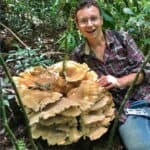Table of Contents
Mushrooms are the reproductive structures of fungal decomposers. These fungi get energy by decomposing complex organic compounds found in dead tissues. After the decomposition process, they form reproductive structures we know as mushrooms.
What is Decomposition?
Decomposition is the process in which organic compounds break down into simpler components. For example, cellulose from plant tissues breaks down into simple sugars like glucose.
What is a Decomposer?
Decomposers are organisms that conduct the decomposition process. Through this process, they get the nutrients and energy-rich molecules they need. The most common decomposers include bacteria, invertebrates, and fungi.
- Bacteria consume food sources that are high in nitrogen or contain simple carbohydrates. This includes materials like manure, grass clippings, or green leaves.
- Fungi consume materials that are tough and woody. They are usually low in nitrogen and contain complex molecules like lignin. Lignin is a structural component of plants that makes them strong. Wood-decay fungi are the only organisms capable of breaking down lignin. Ideal food sources for fungi include wood, brown leaves, dried hay, or sawdust.
- Detritivores are organisms that decay materials through an internal digestive system. This includes a wide array of insects like worms, fly larvae, termites, and certain beetles. Detritivores live in a wide range of materials ranging from manure, wood, or food scraps.
Plants are Producers
In contrast to decomposers, plants are producers. Producers are the foundation of the ecological food web on which all other forms of life depend. They gain their energy from the sun through the process of photosynthesis. Using this process, they form carbon-based molecules necessary for energy and structural strength.
How do Fungi decompose?
Unlike us, fungi do not have complex internal digestive systems. They break down materials externally. They do this by exuding acids and enzymes into their food source. Afterward, they absorb this nutrient through their mycelium. Mycelium is the white, cottony webs of tissue that form the actual body of the fungi.
Why Decomposers are important
Decomposers play an important role in ecological systems. They release energy locked up in complex molecules accessible to the food web.
For example:
- A mushroom-forming fungus consumes wood and converts it into fungal tissues.
- These fungal tissues become a nutritious food source to a wide array of insects.
- These insects are then consumed by larger animals and so on.
Decomposers are important for soil health and nutrient cycling. They can release essential nutrients stored in dead tissues back into the soil. Here they will be accessible to plants and organisms in the soil food web.
Decomposers are important regulators of our atmosphere and climate. They release Carbon Dioxide fixed in plant tissues back into the atmosphere. While in our modern-day context this sounds harmful, it is crucial to the stability of our climate.
Are Mycorrhizal Fungi Decomposers?
Mycorrhizal fungi form symbiotic relationships with plants. They provide plants with greater access to soil nutrients in exchange for carbohydrates.
Many mycorrhizal fungi still conduct decomposition. They break down organic materials, whose nutrients they exchange with plants. In return, they receive energy-rich carbohydrates. In some cases, mycorrhizal fungi may be consuming carbon from organic matter.
There are also Mycorrhizal Fungi who appear to do little or no decomposition. This includes the Glomeromycota. These fungi form a symbiosis with a majority of plant species

